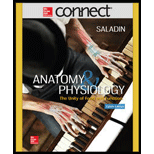
Introduction:
A joint is a region where two bones or a bone and a cartilage meet. The humerus is the bone of the upper arm that runs from the shoulder to the elbow. The humerus connects with the scapula to form the shoulder joint. Rotation is the movement of the bone around an axis. Internal rotation occurs when the shoulder revolves towards the midline and external rotation occurs when the movement occurs away from the midline.
Answer to Problem 1TYR
Correct answer:
The internal and external rotation of the humerus occurs because it is a ball-and-socket joint. Therefore, option c is correct.
Explanation of Solution
Justify reasons for the correct statement:
The ball and socket joint is a multiaxial synovial joint that allows movements such as flexion, extension, external and internal rotation in multiple axes.
Option (c) is given as, “ball-and-socket joint”.
The shoulder bone, the humerus is an example for ball and socket joint. The ball and socket joint occurs when the humerus head, which is ball shaped, fits into the socket of another bone, the scapula. It is a highly mobile joint that is involved in both internal and external rotational movements.
Hence, option (c) is correct.
Justify reasons for the incorrect statements:
Option (a) is given as, “pivot”.
Pivot joint is a freely movable synovial joint. It is a uniaxial joint that allows rotational movement only in a single axis. So, it is a wrong answer.
Option (b) is given as, “condylar”.
A condyloid joint is a biaxial joint that allows movement, such as flexion, adduction, and extension in two axes. It does not allow rotational movement. Therefore, it is a wrong answer.
Option (d) is given as, “saddle”.
The saddle joint occurs in the bones that are saddle shaped. It is a synovial joint that allows movements such as flexion, abduction, and circumduction but no rotation. Hence, it is a wrong answer.
Option (e) is given as, “hinge”.
Hinge joint is a type of synovial joint. It allows movements such as flexion and extension in a single axis. So, it is a wrong answer.
Hence, options (a), (b), (d), and (e) are incorrect.
The humerus produces both internal and external rotation because it is a ball-and-socket joint.
Want to see more full solutions like this?
Chapter 9 Solutions
CONNECT ACCESS CARD FOR ANATOMY AND PHYSIOLOGY
- All of these bony features are near or in the hip joint, EXCEPT the __________. A. acetabulum B. sacral promontory C. greater trochanter D. neck of the femur E. A, B, and Darrow_forwardCondyloid joints ________. Choose one answer. a. are a type of ball-and-socket joint b. include the radiocarpal joint c. are a uniaxial diarthrosis joint d. are found at the proximal radioulnar jointarrow_forwardWhich of the following joints does not allow pronation to occur? Select one: b. Distal radioulnar c. Humeroulnar d. Proximal radioulnararrow_forward
- Bursitis of the subacromial bursa could result froma. flexing the wrist.b. kneeling.c. overusing the shoulder joint.d. running a long distance.e. extending the elbowarrow_forwardA synchondrosis is ________.a. found at the pubic symphysisb. where bones are connected together withfibrocartilagec. a type of fibrous jointd. found at the first sternocostal joint of the thoraciccagearrow_forwardA shoulder separation results from injury to the ________. a. glenohumeral joint b. costoclavicular joint c. acromioclavicular joint d. sternoclavicular jointarrow_forward
- Clavicle articulates anteriorly with... O A. sternum O B. scapula O C. radius O D. humerusarrow_forwardWhich of the following joints allows for flexion and extension of the head? A. Intervertebral B. Atlantooccipital C. Axialoccipital D. Atlantoaxialarrow_forwardAll of the following are carpal bones except the _____, which is a tarsal bone a. trapezium d. triquetrum b. cuboid e. pisiform c. trapezoidarrow_forward
- The ______ flexes the knee and causes a slight medial rotationto “unlock” the knee joint.a. sartoriusb. soleusc. tensor fasciae lataed. popliteusarrow_forwardWhich of the following joints cannot be circumducted? a. trapeziometacarpal b. metacarpophalangeal c. glenohumeral d. coxal e. interphalangealarrow_forwardMatch the following terms with the correct numbers in the figure below bone 6 8 10 bonearrow_forward
 Medical Terminology for Health Professions, Spira...Health & NutritionISBN:9781305634350Author:Ann Ehrlich, Carol L. Schroeder, Laura Ehrlich, Katrina A. SchroederPublisher:Cengage LearningBasic Clinical Lab Competencies for Respiratory C...NursingISBN:9781285244662Author:WhitePublisher:Cengage
Medical Terminology for Health Professions, Spira...Health & NutritionISBN:9781305634350Author:Ann Ehrlich, Carol L. Schroeder, Laura Ehrlich, Katrina A. SchroederPublisher:Cengage LearningBasic Clinical Lab Competencies for Respiratory C...NursingISBN:9781285244662Author:WhitePublisher:Cengage



